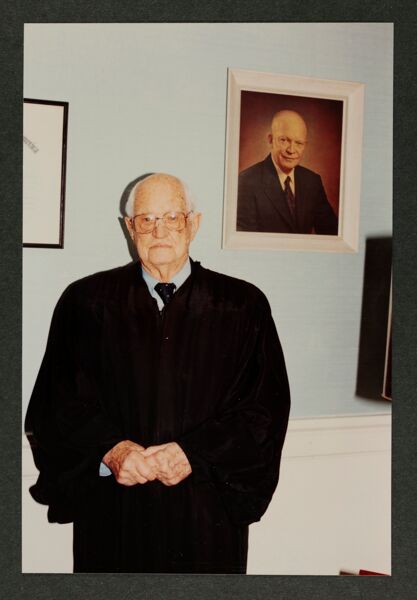
Perhaps no single member of Pi Kappa Alpha has had as great an impact on both the Fraternity and the nation as Elbert P. Tuttle. Tuttle's first work for the Fraternity at the national level came when he was elected Grand Chancellor at the 1927 Atlanta Convention. At the 1929 Memphis Convention, Tuttle was elected Grand Princeps - the Fraternity's highest office - a position he would hold until 1938. Tuttle left his most significant mark on the Fraternity at the 1933 Troutdale Convention when he convinced Junior Founder and Grand Treasurer Robert Adger Smythe to give up control of the Fraternity's finances after irregularities were discovered. A lawyer by profession, Tuttle established his reputation as a lawyer committed to upholding the principle of law and for supporting African American defendants throughout the 1930s. As a member of the Georgia National Guard in 1931, he helped save a black man from lynching by an angry mob, later agreeing to serve as the man's lawyer. Two years later, Tuttle took on the case of another black man who had been sentenced to 18 years of hard labor for simply distributing literature calling for the end of segregation. With the outbreak of World War II, however, Tuttle left his law practice to enlist in the Army, rising to command a field artillery battalion of the 77th Infantry Division. Although he was offered a non-combat staff position, Tuttle refused to be a non-combatant while young men - including his son and nephew - served in active combat. Seeing action in the Pacific theater, Tuttle took part in the invasion of Guam, Leyte Gulf, and Okinawa. In 1954, Tuttle was appointed to the United States Court of Appeals for the Fifth Circuit - the court responsible for the majority of Southern states. Accepting the appointment just weeks after the Supreme Court's decision in Brown v. Board of Education, Tuttle walked into a political and judicial firestorm as political leaders urged their constituents to defy federal law, and many state and federal judges refused to enforce the Brown decision and other civil rights rulings. Judge Tuttle, however, upheld the law - reversing lower court judges and blocking unlawful treatment of black citizens. His notable rulings included: requiring Mississippi to permit black citizens to vote, ordering the first black student admitted to the University of Mississippi, and blocking an order from a lower court that would have permitted the expulsion of over 1,000 black Alabama high school students who had been arrested for demonstration for civil rights. Refusing to allow the Fraternity system to continue to discriminate either, Tuttle urged Fraternities throughout the period to give up discriminatory membership practices and to accept any worthy member, regardless of race. For his adherence to principle in the face of adversity during the Civil Rights Era - which came in the form of local ostracism, hate mail, and even threats of physical violence - Judge Tuttle was awarded the Presidential Medal of Freedom in 1981.